Analyzing Corporate Governance and Sustainability Reporting Issues
VerifiedAdded on 2023/06/04
|10
|1191
|355
Report
AI Summary
This report provides an overview of corporate governance and sustainability reporting, highlighting the importance of sustainability in the modern business world. It discusses the necessity of sustainability reporting for strategizing organizational culture and societal practices. The report covers reporting frameworks, standards, and legislations, emphasizing corporate governance pillars such as accountability, transparency, independence, and fairness. It addresses current issues and challenges in sustainability reporting, including identifying the target audience and ensuring effective compliance with GRI standards. The report also explores future prospects, such as enhanced communication and the development of integrated reporting. It concludes that effective sustainability reporting is crucial for enhancing internal efficiency and addressing the imbalance between society and organizations, ensuring long-run sustainability of economic and business activities. Desklib offers a range of study tools and solved assignments to support students in understanding these complex topics.
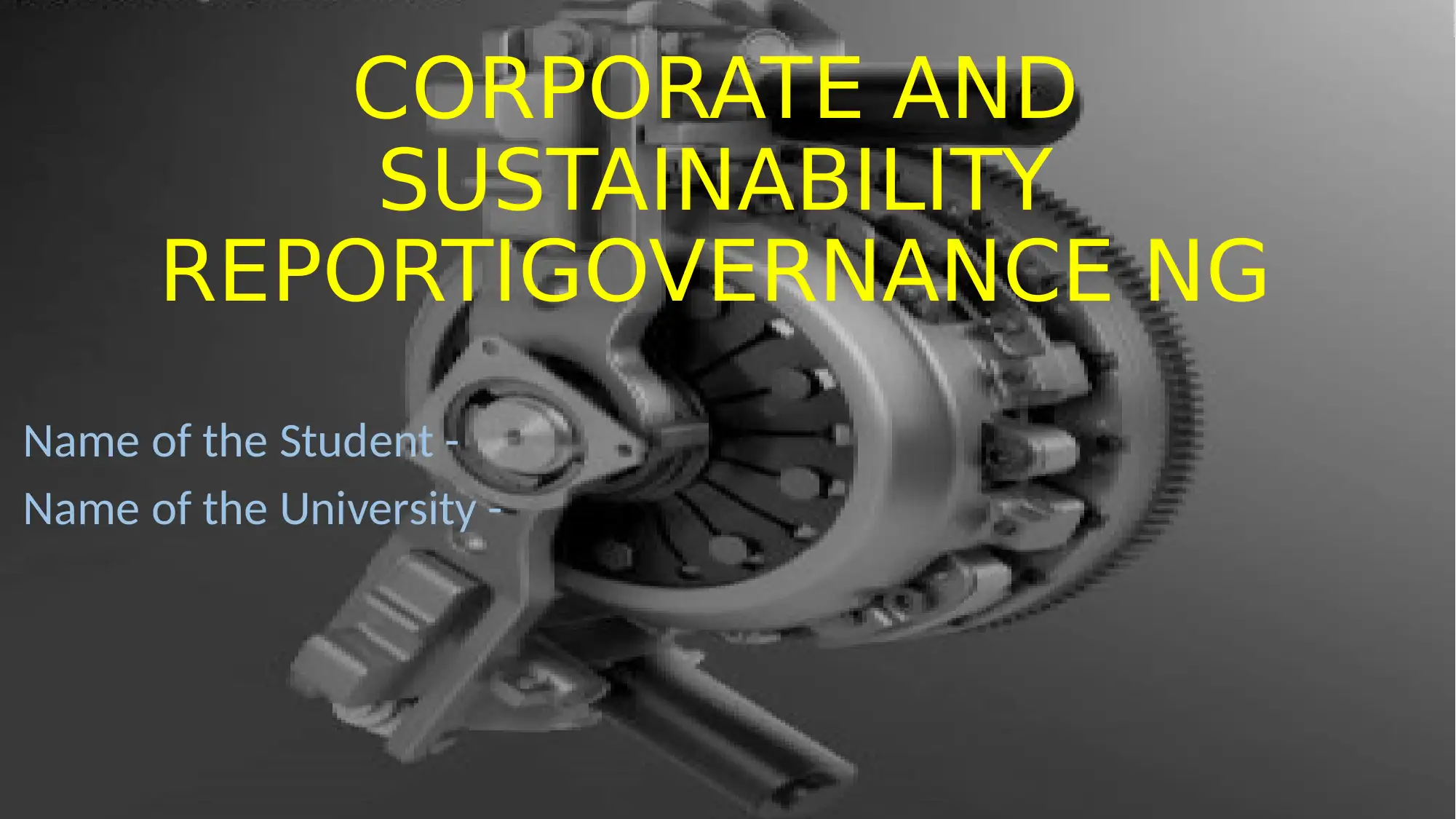
CORPORATE AND
SUSTAINABILITY
REPORTIGOVERNANCE NG
Name of the Student -
Name of the University -
SUSTAINABILITY
REPORTIGOVERNANCE NG
Name of the Student -
Name of the University -
Paraphrase This Document
Need a fresh take? Get an instant paraphrase of this document with our AI Paraphraser
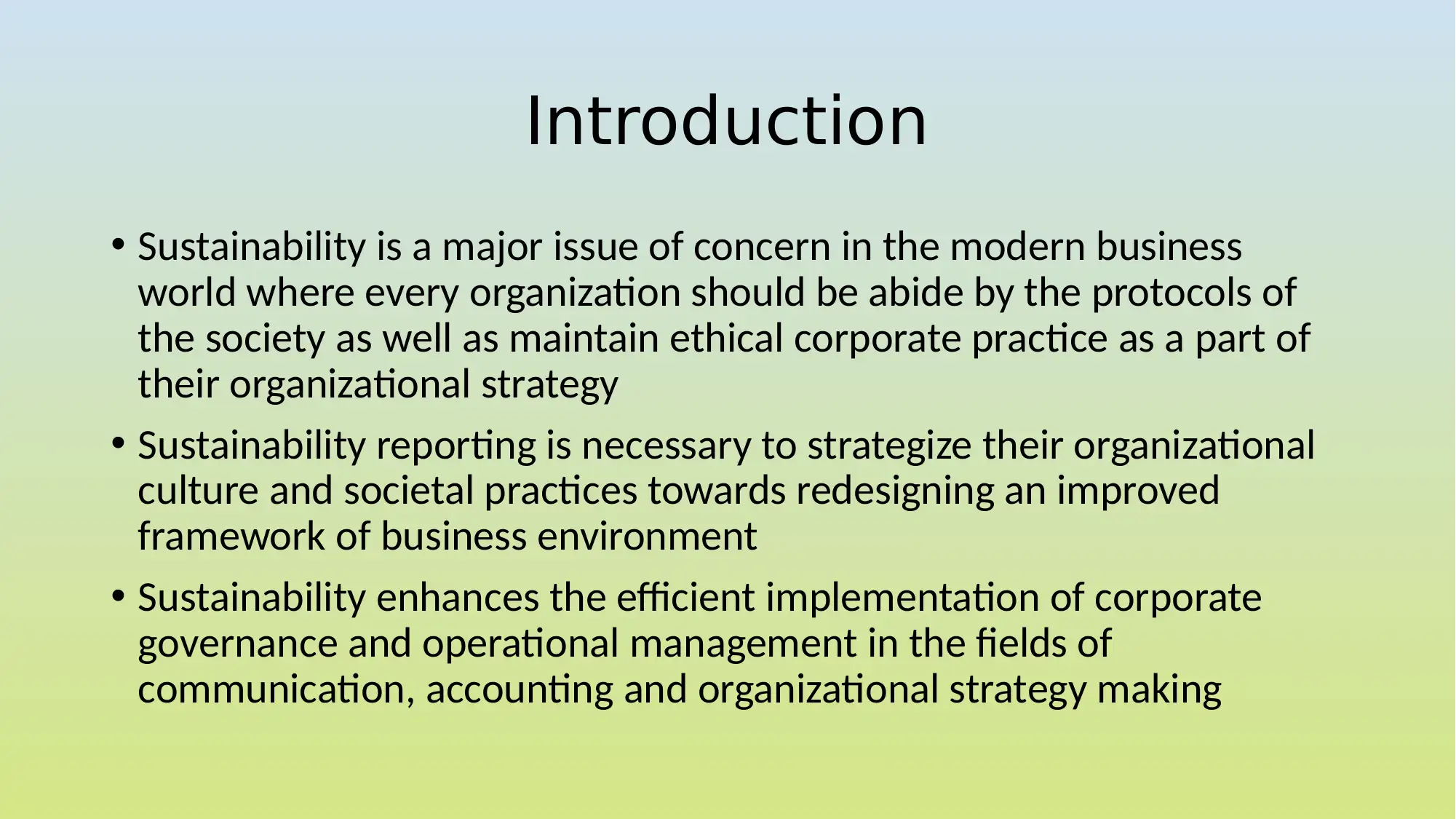
Introduction
• Sustainability is a major issue of concern in the modern business
world where every organization should be abide by the protocols of
the society as well as maintain ethical corporate practice as a part of
their organizational strategy
• Sustainability reporting is necessary to strategize their organizational
culture and societal practices towards redesigning an improved
framework of business environment
• Sustainability enhances the efficient implementation of corporate
governance and operational management in the fields of
communication, accounting and organizational strategy making
• Sustainability is a major issue of concern in the modern business
world where every organization should be abide by the protocols of
the society as well as maintain ethical corporate practice as a part of
their organizational strategy
• Sustainability reporting is necessary to strategize their organizational
culture and societal practices towards redesigning an improved
framework of business environment
• Sustainability enhances the efficient implementation of corporate
governance and operational management in the fields of
communication, accounting and organizational strategy making
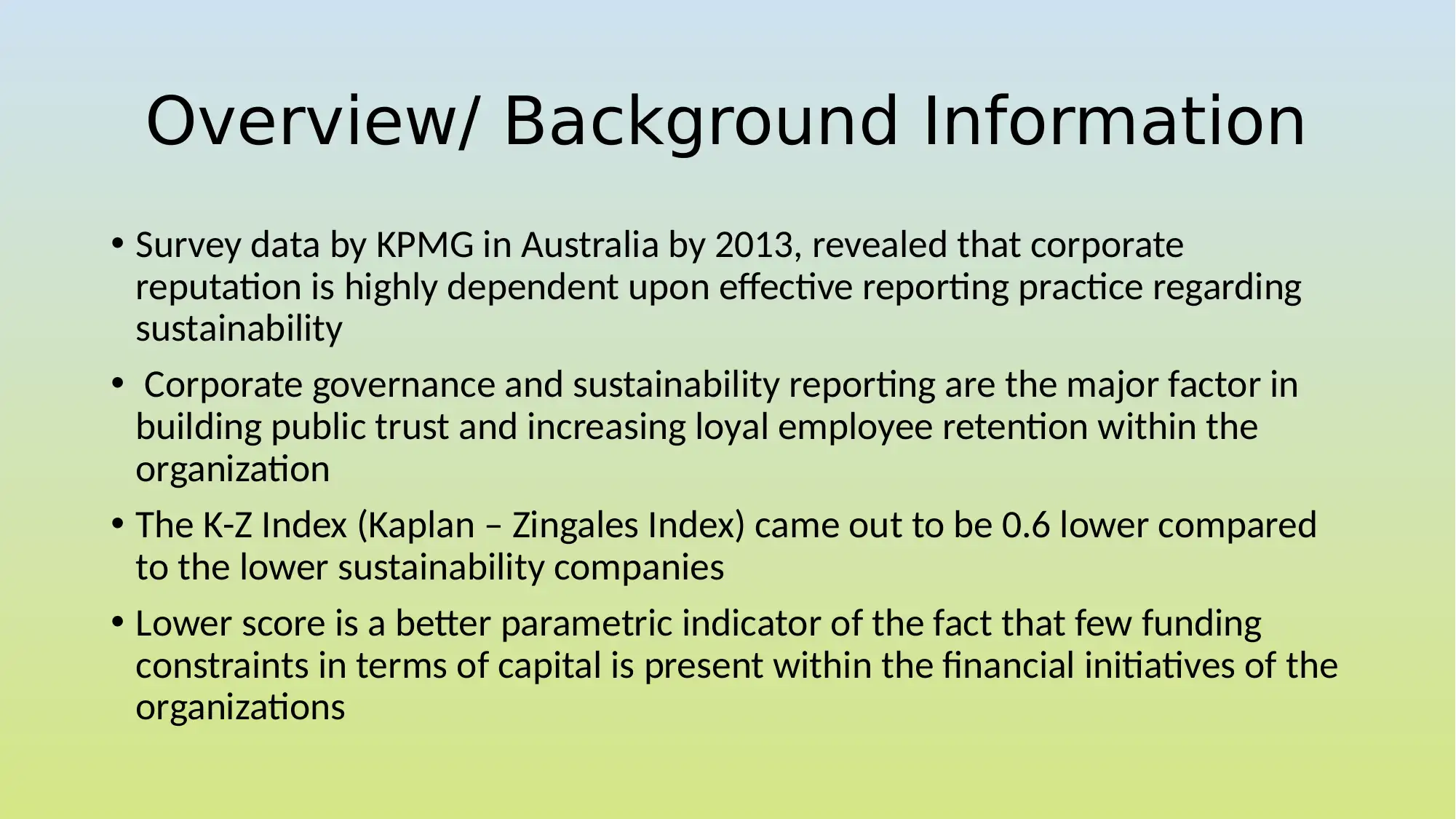
Overview/ Background Information
• Survey data by KPMG in Australia by 2013, revealed that corporate
reputation is highly dependent upon effective reporting practice regarding
sustainability
• Corporate governance and sustainability reporting are the major factor in
building public trust and increasing loyal employee retention within the
organization
• The K-Z Index (Kaplan – Zingales Index) came out to be 0.6 lower compared
to the lower sustainability companies
• Lower score is a better parametric indicator of the fact that few funding
constraints in terms of capital is present within the financial initiatives of the
organizations
• Survey data by KPMG in Australia by 2013, revealed that corporate
reputation is highly dependent upon effective reporting practice regarding
sustainability
• Corporate governance and sustainability reporting are the major factor in
building public trust and increasing loyal employee retention within the
organization
• The K-Z Index (Kaplan – Zingales Index) came out to be 0.6 lower compared
to the lower sustainability companies
• Lower score is a better parametric indicator of the fact that few funding
constraints in terms of capital is present within the financial initiatives of the
organizations
⊘ This is a preview!⊘
Do you want full access?
Subscribe today to unlock all pages.

Trusted by 1+ million students worldwide
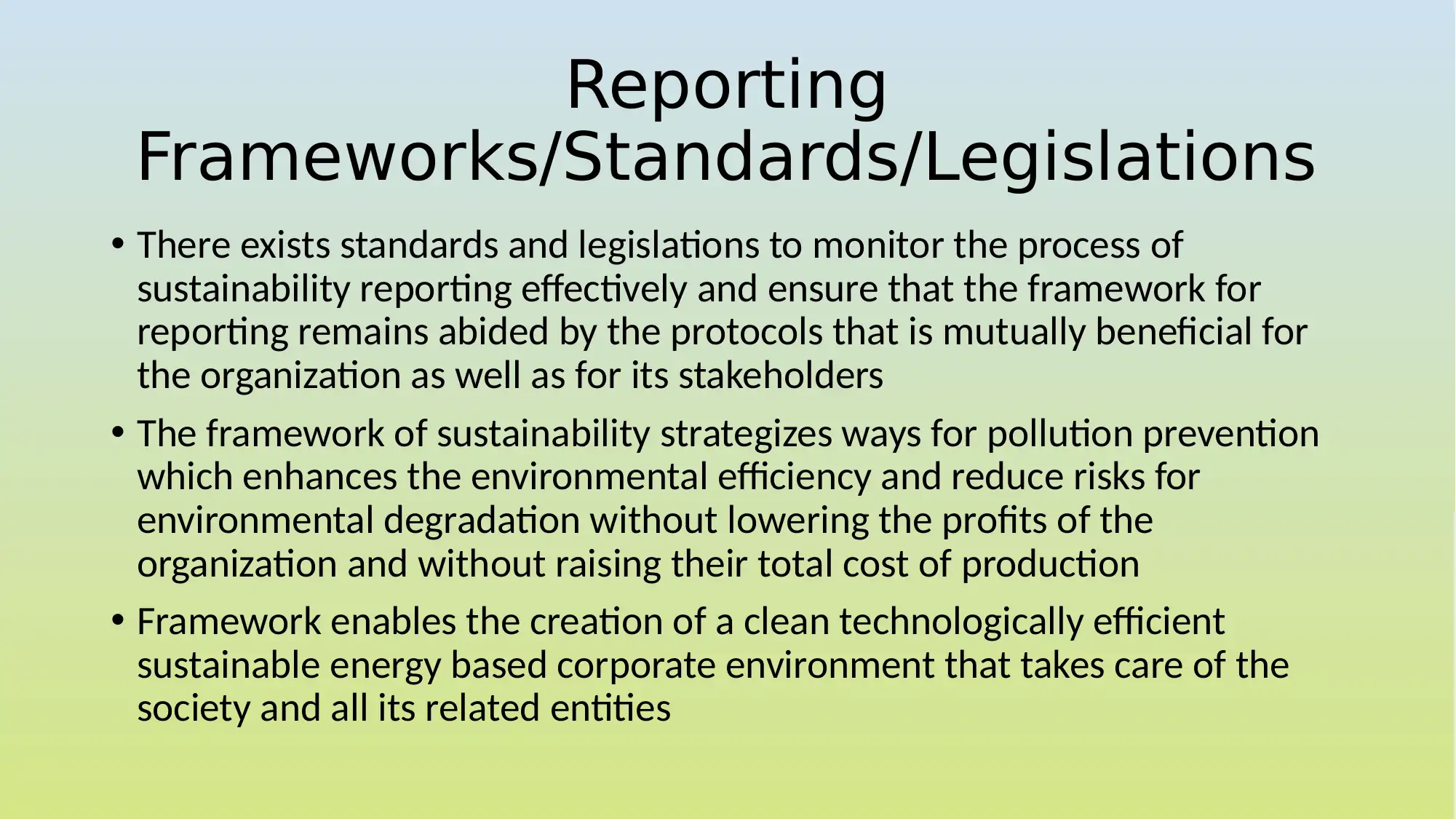
Reporting
Frameworks/Standards/Legislations
• There exists standards and legislations to monitor the process of
sustainability reporting effectively and ensure that the framework for
reporting remains abided by the protocols that is mutually beneficial for
the organization as well as for its stakeholders
• The framework of sustainability strategizes ways for pollution prevention
which enhances the environmental efficiency and reduce risks for
environmental degradation without lowering the profits of the
organization and without raising their total cost of production
• Framework enables the creation of a clean technologically efficient
sustainable energy based corporate environment that takes care of the
society and all its related entities
Frameworks/Standards/Legislations
• There exists standards and legislations to monitor the process of
sustainability reporting effectively and ensure that the framework for
reporting remains abided by the protocols that is mutually beneficial for
the organization as well as for its stakeholders
• The framework of sustainability strategizes ways for pollution prevention
which enhances the environmental efficiency and reduce risks for
environmental degradation without lowering the profits of the
organization and without raising their total cost of production
• Framework enables the creation of a clean technologically efficient
sustainable energy based corporate environment that takes care of the
society and all its related entities
Paraphrase This Document
Need a fresh take? Get an instant paraphrase of this document with our AI Paraphraser
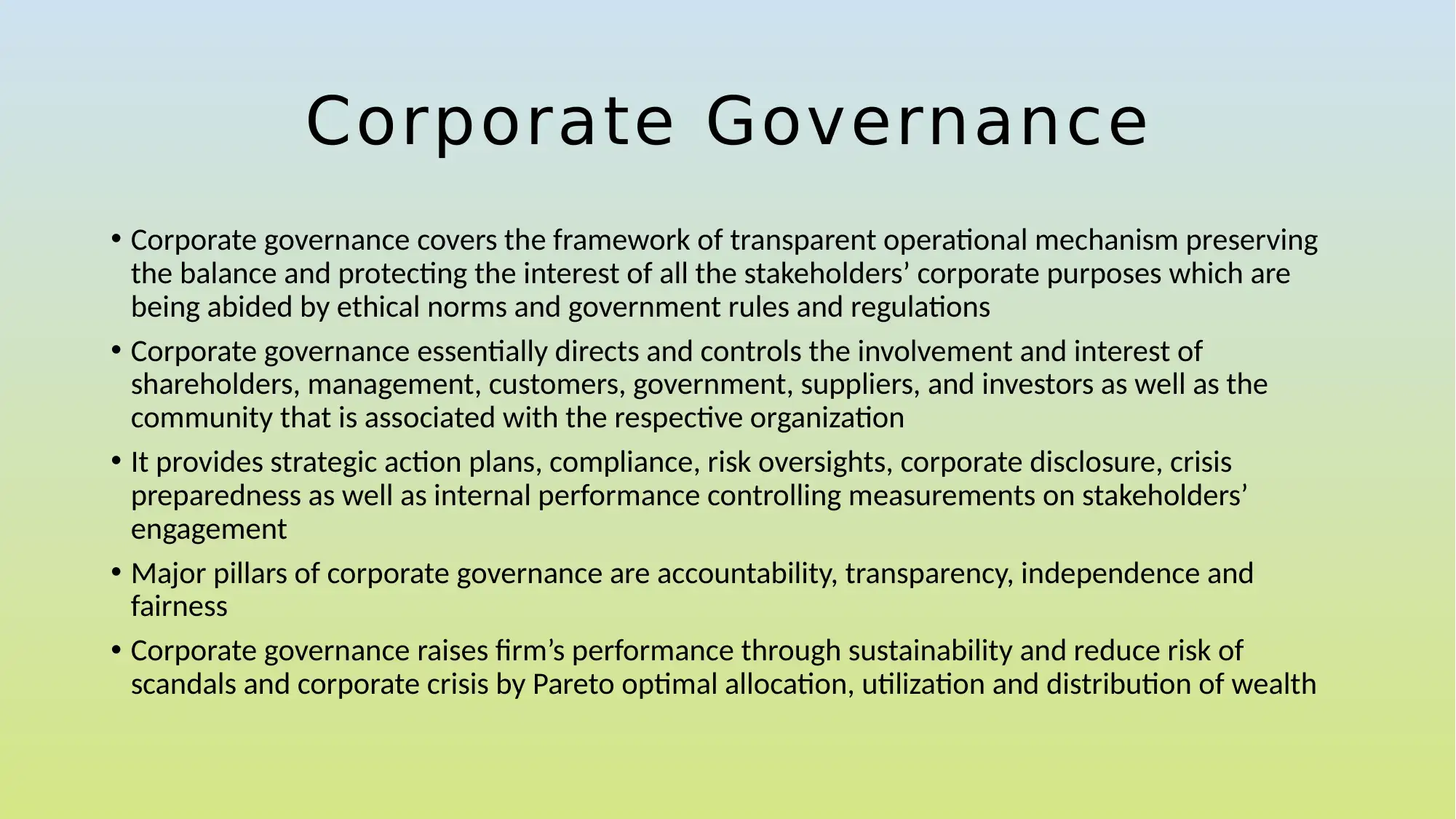
Corporate Governance
• Corporate governance covers the framework of transparent operational mechanism preserving
the balance and protecting the interest of all the stakeholders’ corporate purposes which are
being abided by ethical norms and government rules and regulations
• Corporate governance essentially directs and controls the involvement and interest of
shareholders, management, customers, government, suppliers, and investors as well as the
community that is associated with the respective organization
• It provides strategic action plans, compliance, risk oversights, corporate disclosure, crisis
preparedness as well as internal performance controlling measurements on stakeholders’
engagement
• Major pillars of corporate governance are accountability, transparency, independence and
fairness
• Corporate governance raises firm’s performance through sustainability and reduce risk of
scandals and corporate crisis by Pareto optimal allocation, utilization and distribution of wealth
• Corporate governance covers the framework of transparent operational mechanism preserving
the balance and protecting the interest of all the stakeholders’ corporate purposes which are
being abided by ethical norms and government rules and regulations
• Corporate governance essentially directs and controls the involvement and interest of
shareholders, management, customers, government, suppliers, and investors as well as the
community that is associated with the respective organization
• It provides strategic action plans, compliance, risk oversights, corporate disclosure, crisis
preparedness as well as internal performance controlling measurements on stakeholders’
engagement
• Major pillars of corporate governance are accountability, transparency, independence and
fairness
• Corporate governance raises firm’s performance through sustainability and reduce risk of
scandals and corporate crisis by Pareto optimal allocation, utilization and distribution of wealth
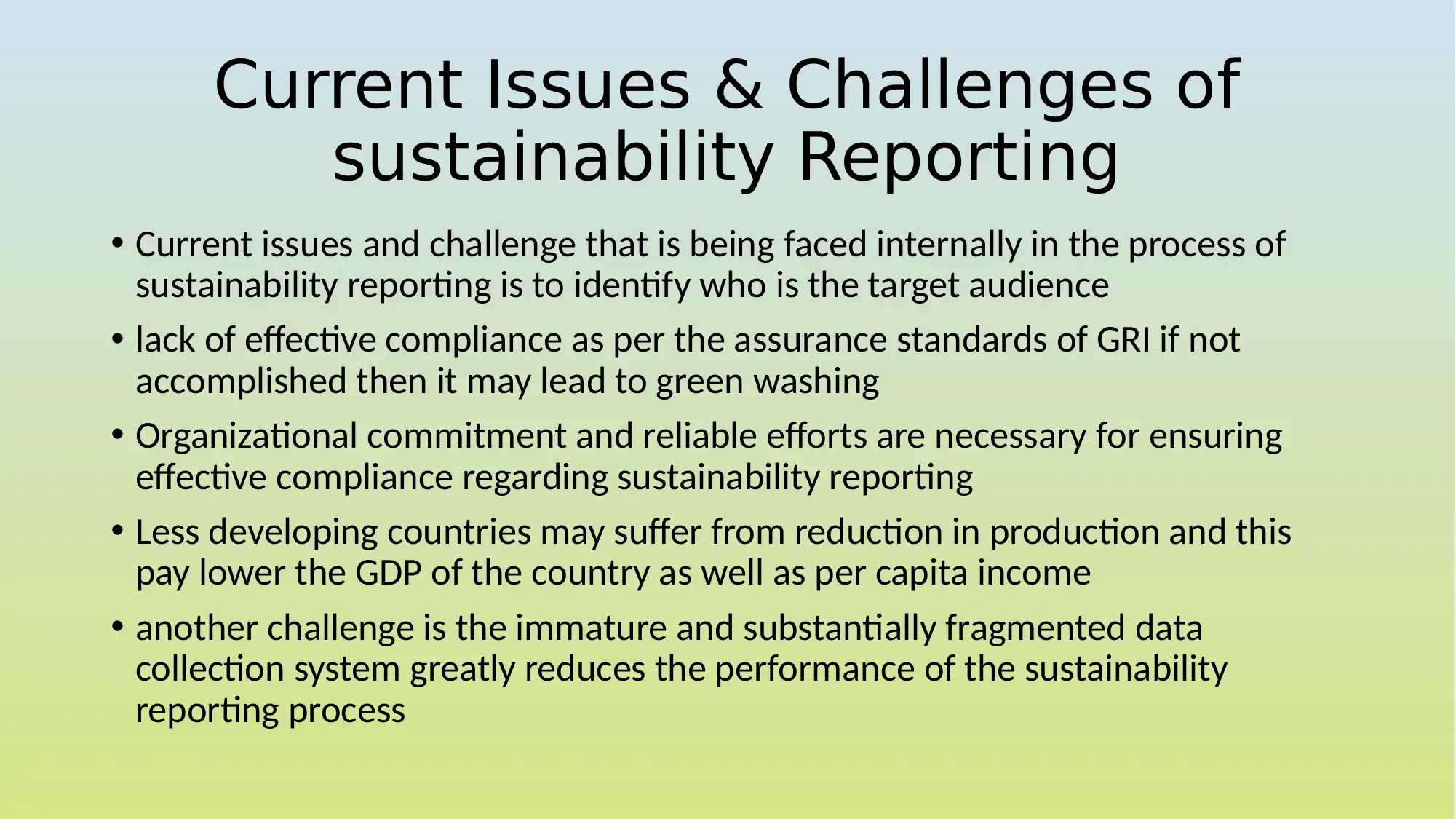
Current Issues & Challenges of
sustainability Reporting
• Current issues and challenge that is being faced internally in the process of
sustainability reporting is to identify who is the target audience
• lack of effective compliance as per the assurance standards of GRI if not
accomplished then it may lead to green washing
• Organizational commitment and reliable efforts are necessary for ensuring
effective compliance regarding sustainability reporting
• Less developing countries may suffer from reduction in production and this
pay lower the GDP of the country as well as per capita income
• another challenge is the immature and substantially fragmented data
collection system greatly reduces the performance of the sustainability
reporting process
sustainability Reporting
• Current issues and challenge that is being faced internally in the process of
sustainability reporting is to identify who is the target audience
• lack of effective compliance as per the assurance standards of GRI if not
accomplished then it may lead to green washing
• Organizational commitment and reliable efforts are necessary for ensuring
effective compliance regarding sustainability reporting
• Less developing countries may suffer from reduction in production and this
pay lower the GDP of the country as well as per capita income
• another challenge is the immature and substantially fragmented data
collection system greatly reduces the performance of the sustainability
reporting process
⊘ This is a preview!⊘
Do you want full access?
Subscribe today to unlock all pages.

Trusted by 1+ million students worldwide
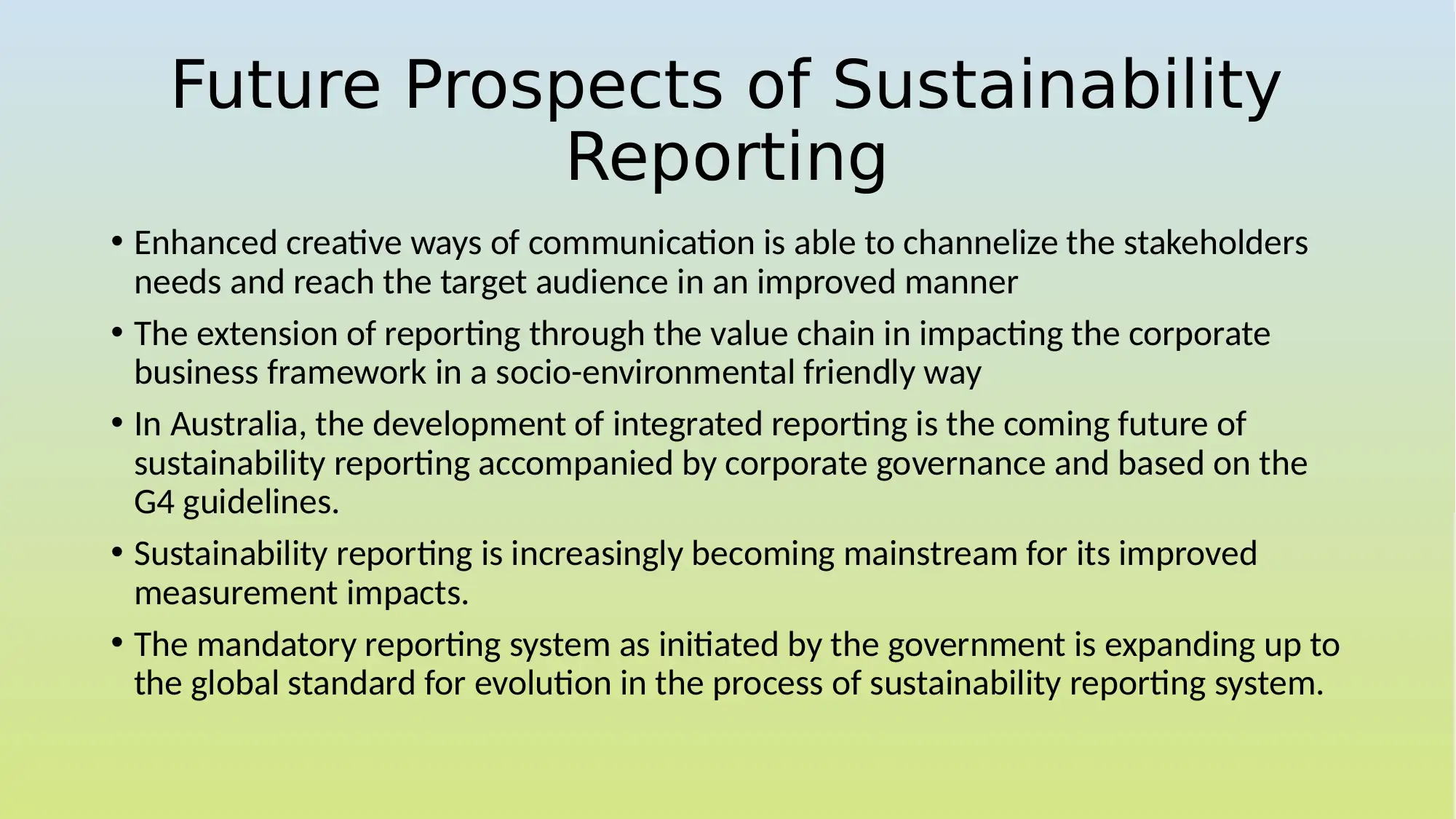
Future Prospects of Sustainability
Reporting
• Enhanced creative ways of communication is able to channelize the stakeholders
needs and reach the target audience in an improved manner
• The extension of reporting through the value chain in impacting the corporate
business framework in a socio-environmental friendly way
• In Australia, the development of integrated reporting is the coming future of
sustainability reporting accompanied by corporate governance and based on the
G4 guidelines.
• Sustainability reporting is increasingly becoming mainstream for its improved
measurement impacts.
• The mandatory reporting system as initiated by the government is expanding up to
the global standard for evolution in the process of sustainability reporting system.
Reporting
• Enhanced creative ways of communication is able to channelize the stakeholders
needs and reach the target audience in an improved manner
• The extension of reporting through the value chain in impacting the corporate
business framework in a socio-environmental friendly way
• In Australia, the development of integrated reporting is the coming future of
sustainability reporting accompanied by corporate governance and based on the
G4 guidelines.
• Sustainability reporting is increasingly becoming mainstream for its improved
measurement impacts.
• The mandatory reporting system as initiated by the government is expanding up to
the global standard for evolution in the process of sustainability reporting system.
Paraphrase This Document
Need a fresh take? Get an instant paraphrase of this document with our AI Paraphraser
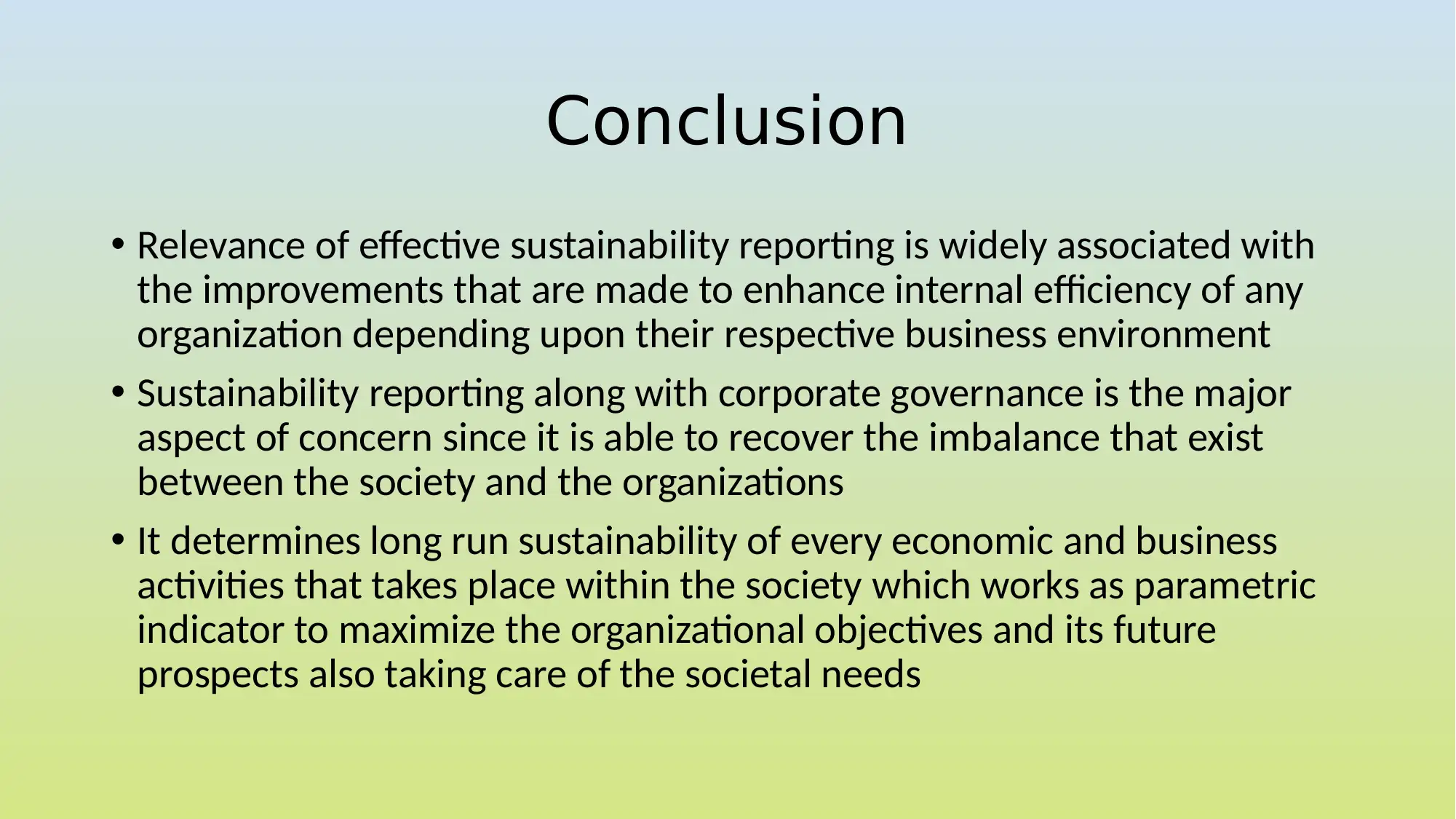
Conclusion
• Relevance of effective sustainability reporting is widely associated with
the improvements that are made to enhance internal efficiency of any
organization depending upon their respective business environment
• Sustainability reporting along with corporate governance is the major
aspect of concern since it is able to recover the imbalance that exist
between the society and the organizations
• It determines long run sustainability of every economic and business
activities that takes place within the society which works as parametric
indicator to maximize the organizational objectives and its future
prospects also taking care of the societal needs
• Relevance of effective sustainability reporting is widely associated with
the improvements that are made to enhance internal efficiency of any
organization depending upon their respective business environment
• Sustainability reporting along with corporate governance is the major
aspect of concern since it is able to recover the imbalance that exist
between the society and the organizations
• It determines long run sustainability of every economic and business
activities that takes place within the society which works as parametric
indicator to maximize the organizational objectives and its future
prospects also taking care of the societal needs
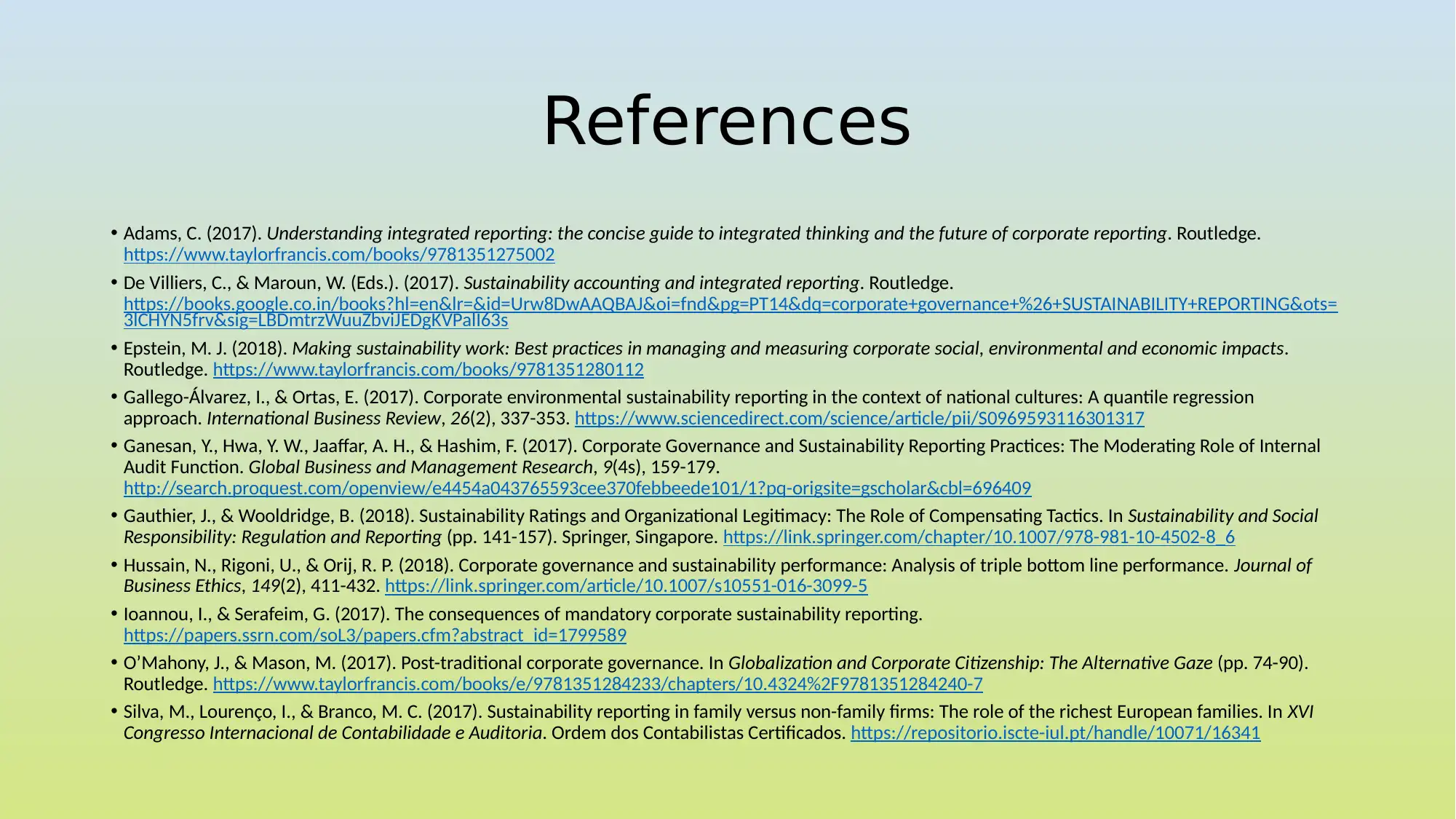
References
• Adams, C. (2017). Understanding integrated reporting: the concise guide to integrated thinking and the future of corporate reporting. Routledge.
https://www.taylorfrancis.com/books/9781351275002
• De Villiers, C., & Maroun, W. (Eds.). (2017). Sustainability accounting and integrated reporting. Routledge.
https://books.google.co.in/books?hl=en&lr=&id=Urw8DwAAQBAJ&oi=fnd&pg=PT14&dq=corporate+governance+%26+SUSTAINABILITY+REPORTING&ots=
3lCHYN5frv&sig=LBDmtrzWuuZbviJEDgKVPalI63s
• Epstein, M. J. (2018). Making sustainability work: Best practices in managing and measuring corporate social, environmental and economic impacts.
Routledge. https://www.taylorfrancis.com/books/9781351280112
• Gallego-Álvarez, I., & Ortas, E. (2017). Corporate environmental sustainability reporting in the context of national cultures: A quantile regression
approach. International Business Review, 26(2), 337-353. https://www.sciencedirect.com/science/article/pii/S0969593116301317
• Ganesan, Y., Hwa, Y. W., Jaaffar, A. H., & Hashim, F. (2017). Corporate Governance and Sustainability Reporting Practices: The Moderating Role of Internal
Audit Function. Global Business and Management Research, 9(4s), 159-179.
http://search.proquest.com/openview/e4454a043765593cee370febbeede101/1?pq-origsite=gscholar&cbl=696409
• Gauthier, J., & Wooldridge, B. (2018). Sustainability Ratings and Organizational Legitimacy: The Role of Compensating Tactics. In Sustainability and Social
Responsibility: Regulation and Reporting (pp. 141-157). Springer, Singapore. https://link.springer.com/chapter/10.1007/978-981-10-4502-8_6
• Hussain, N., Rigoni, U., & Orij, R. P. (2018). Corporate governance and sustainability performance: Analysis of triple bottom line performance. Journal of
Business Ethics, 149(2), 411-432. https://link.springer.com/article/10.1007/s10551-016-3099-5
• Ioannou, I., & Serafeim, G. (2017). The consequences of mandatory corporate sustainability reporting.
https://papers.ssrn.com/soL3/papers.cfm?abstract_id=1799589
• O’Mahony, J., & Mason, M. (2017). Post-traditional corporate governance. In Globalization and Corporate Citizenship: The Alternative Gaze (pp. 74-90).
Routledge. https://www.taylorfrancis.com/books/e/9781351284233/chapters/10.4324%2F9781351284240-7
• Silva, M., Lourenço, I., & Branco, M. C. (2017). Sustainability reporting in family versus non-family firms: The role of the richest European families. In XVI
Congresso Internacional de Contabilidade e Auditoria. Ordem dos Contabilistas Certificados. https://repositorio.iscte-iul.pt/handle/10071/16341
• Adams, C. (2017). Understanding integrated reporting: the concise guide to integrated thinking and the future of corporate reporting. Routledge.
https://www.taylorfrancis.com/books/9781351275002
• De Villiers, C., & Maroun, W. (Eds.). (2017). Sustainability accounting and integrated reporting. Routledge.
https://books.google.co.in/books?hl=en&lr=&id=Urw8DwAAQBAJ&oi=fnd&pg=PT14&dq=corporate+governance+%26+SUSTAINABILITY+REPORTING&ots=
3lCHYN5frv&sig=LBDmtrzWuuZbviJEDgKVPalI63s
• Epstein, M. J. (2018). Making sustainability work: Best practices in managing and measuring corporate social, environmental and economic impacts.
Routledge. https://www.taylorfrancis.com/books/9781351280112
• Gallego-Álvarez, I., & Ortas, E. (2017). Corporate environmental sustainability reporting in the context of national cultures: A quantile regression
approach. International Business Review, 26(2), 337-353. https://www.sciencedirect.com/science/article/pii/S0969593116301317
• Ganesan, Y., Hwa, Y. W., Jaaffar, A. H., & Hashim, F. (2017). Corporate Governance and Sustainability Reporting Practices: The Moderating Role of Internal
Audit Function. Global Business and Management Research, 9(4s), 159-179.
http://search.proquest.com/openview/e4454a043765593cee370febbeede101/1?pq-origsite=gscholar&cbl=696409
• Gauthier, J., & Wooldridge, B. (2018). Sustainability Ratings and Organizational Legitimacy: The Role of Compensating Tactics. In Sustainability and Social
Responsibility: Regulation and Reporting (pp. 141-157). Springer, Singapore. https://link.springer.com/chapter/10.1007/978-981-10-4502-8_6
• Hussain, N., Rigoni, U., & Orij, R. P. (2018). Corporate governance and sustainability performance: Analysis of triple bottom line performance. Journal of
Business Ethics, 149(2), 411-432. https://link.springer.com/article/10.1007/s10551-016-3099-5
• Ioannou, I., & Serafeim, G. (2017). The consequences of mandatory corporate sustainability reporting.
https://papers.ssrn.com/soL3/papers.cfm?abstract_id=1799589
• O’Mahony, J., & Mason, M. (2017). Post-traditional corporate governance. In Globalization and Corporate Citizenship: The Alternative Gaze (pp. 74-90).
Routledge. https://www.taylorfrancis.com/books/e/9781351284233/chapters/10.4324%2F9781351284240-7
• Silva, M., Lourenço, I., & Branco, M. C. (2017). Sustainability reporting in family versus non-family firms: The role of the richest European families. In XVI
Congresso Internacional de Contabilidade e Auditoria. Ordem dos Contabilistas Certificados. https://repositorio.iscte-iul.pt/handle/10071/16341
⊘ This is a preview!⊘
Do you want full access?
Subscribe today to unlock all pages.

Trusted by 1+ million students worldwide

1 out of 10
Related Documents
Your All-in-One AI-Powered Toolkit for Academic Success.
+13062052269
info@desklib.com
Available 24*7 on WhatsApp / Email
![[object Object]](/_next/static/media/star-bottom.7253800d.svg)
Unlock your academic potential
Copyright © 2020–2026 A2Z Services. All Rights Reserved. Developed and managed by ZUCOL.





